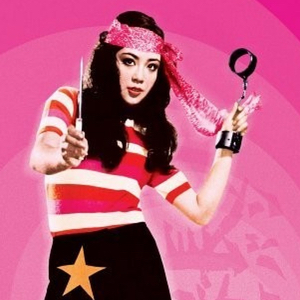Category:Pinky Violence: Difference between revisions
(Created page with "Until the late 1960s, the "Pink Film" market was almost entirely the domain of low-budget independent companies. At the beginning of the 1970s, now losing their audiences...") |
mNo edit summary |
||
| Line 1: | Line 1: | ||
[[File:Pinky-violence-300x300.jpg|none|thumb|frameless|300px|Pinky Violence]] | |||
Until the late 1960s, the "[[Pink Film]]" market was almost entirely the domain of low-budget independent companies. At the beginning of the 1970s, now losing their audiences to television and imported American films, Japan's major film studios were struggling for survival. In 1972, Richie reported, "In Japan, the eroduction is the only type of picture that retains an assured patronage." To tap into this lucrative audience, major studio Toei entered the sexploitation market in 1971. In films like his ero-guro series and Joys of Torture series of the late 1960s director Teruo Ishii provided a model for Toei's sexploitation ventures by "establishing a queasy mix of comedy and torture." Producer Kanji Amao designed a group of series—shigeki rosen (Sensational Line), ijoseiai rosen (Abnormal Line), and harenchi rosen (Shameless Line), today collectively referred to as Toei's "Pinky Violence". Most of Toei's films in this style used eroticism in conjunction with violent and action-filled stories. Several of these films have the theme of strong women exacting violent revenge for past injustices. The series was launched with the Delinquent Girl Boss (Zubeko Bancho) films starring [[Reiko Oshida]]. Other series in the Pinky Violence genre included Norifumi Suzuki's Girl Boss (Sukeban) films, and the Terrifying Girls' High School films, both starring [[Reiko Ike]] and [[Miki Sugimoto]]. | Until the late 1960s, the "[[Pink Film]]" market was almost entirely the domain of low-budget independent companies. At the beginning of the 1970s, now losing their audiences to television and imported American films, Japan's major film studios were struggling for survival. In 1972, Richie reported, "In Japan, the eroduction is the only type of picture that retains an assured patronage." To tap into this lucrative audience, major studio Toei entered the sexploitation market in 1971. In films like his ero-guro series and Joys of Torture series of the late 1960s director Teruo Ishii provided a model for Toei's sexploitation ventures by "establishing a queasy mix of comedy and torture." Producer Kanji Amao designed a group of series—shigeki rosen (Sensational Line), ijoseiai rosen (Abnormal Line), and harenchi rosen (Shameless Line), today collectively referred to as Toei's "Pinky Violence". Most of Toei's films in this style used eroticism in conjunction with violent and action-filled stories. Several of these films have the theme of strong women exacting violent revenge for past injustices. The series was launched with the Delinquent Girl Boss (Zubeko Bancho) films starring [[Reiko Oshida]]. Other series in the Pinky Violence genre included Norifumi Suzuki's Girl Boss (Sukeban) films, and the Terrifying Girls' High School films, both starring [[Reiko Ike]] and [[Miki Sugimoto]]. | ||
Revision as of 18:34, 13 April 2020

Until the late 1960s, the "Pink Film" market was almost entirely the domain of low-budget independent companies. At the beginning of the 1970s, now losing their audiences to television and imported American films, Japan's major film studios were struggling for survival. In 1972, Richie reported, "In Japan, the eroduction is the only type of picture that retains an assured patronage." To tap into this lucrative audience, major studio Toei entered the sexploitation market in 1971. In films like his ero-guro series and Joys of Torture series of the late 1960s director Teruo Ishii provided a model for Toei's sexploitation ventures by "establishing a queasy mix of comedy and torture." Producer Kanji Amao designed a group of series—shigeki rosen (Sensational Line), ijoseiai rosen (Abnormal Line), and harenchi rosen (Shameless Line), today collectively referred to as Toei's "Pinky Violence". Most of Toei's films in this style used eroticism in conjunction with violent and action-filled stories. Several of these films have the theme of strong women exacting violent revenge for past injustices. The series was launched with the Delinquent Girl Boss (Zubeko Bancho) films starring Reiko Oshida. Other series in the Pinky Violence genre included Norifumi Suzuki's Girl Boss (Sukeban) films, and the Terrifying Girls' High School films, both starring Reiko Ike and Miki Sugimoto.
Other examples of Toei's films in this genre include Shunya Ito's Sasori (Scorpion) series of women in prison films based on Toru Shinohara's manga. Starting with Female Convict #701: Scorpion (1972), the Scorpion series starred Meiko Kaji, who had left Nikkatsu Studios to distance herself from their Roman Porno series. Toei also set the standard for Japanese nunsploitation films (a subgenre imported from Italy) with the critically acclaimed School of the Holy Beast (1974) directed by Norifumi Suzuki. Toei also produced a whole series of erotic samurai pictures such as Bohachi Bushido: Clan of the Forgotten Eight (Bōhachi Bushidō: Poruno Jidaigeki) (1973).